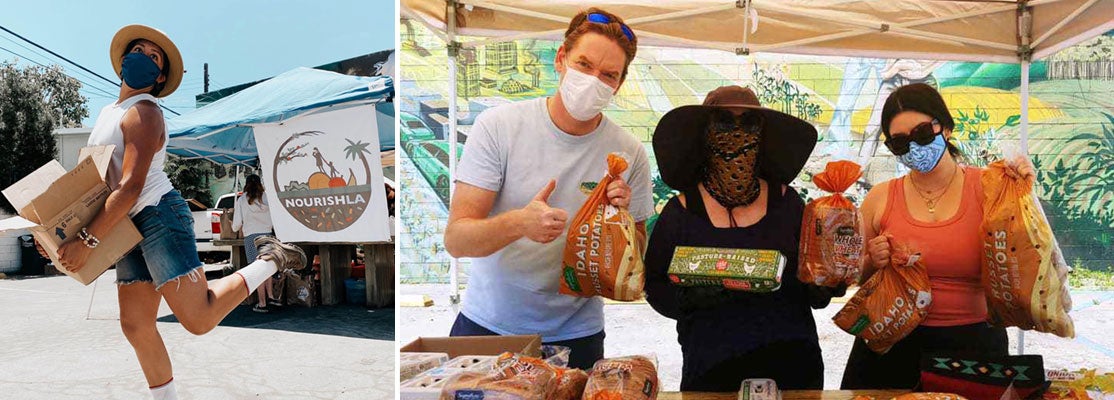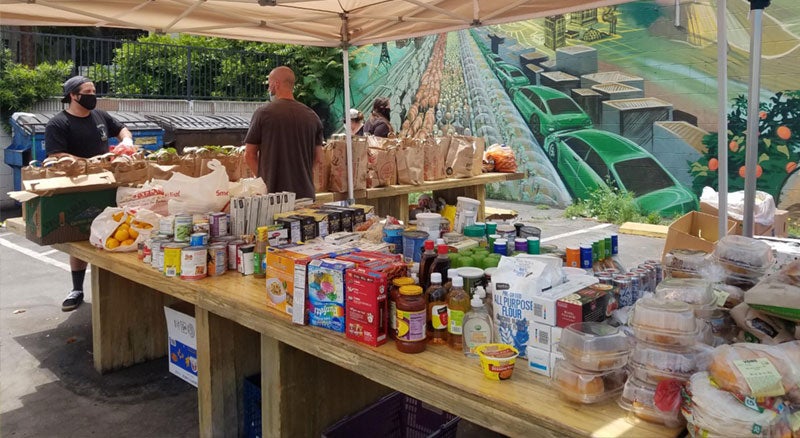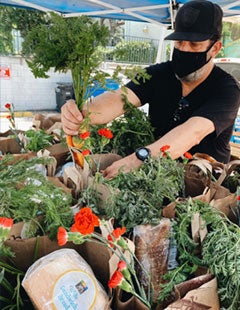Pandemic Spurs UCLA Anderson Students and Alumni to Advise Nonprofits and Social Enterprises
Pandemic Spurs UCLA Anderson Students and Alumni to Advise Nonprofits and Social Enterprises

Natalie Flores (left) founded the nonprofit Nourish L.A. to help people who lost jobs as a result of the coronavirus pandemic | Nourish L.A. volunteers help feed as many as 1,000 food-insecure families per week
- UCLA Anderson students Joe Roohan (’21) and Charles Moran (’21) founded Crisis Response Corps to match organizations in need with student consultants
- Becki Berumen (’21) and Shawna Anderson (’20) are advising Nourish L.A., which provides groceries to food-insecure families
- CRC fills the void left by companies’ forgoing interns during the pandemic
In March 2020, the pandemic forced UCLA to suspend on-campus classes. At the same time, scores of UCLA Anderson students suddenly found themselves unable to secure the summer internships they had hoped would boost their resumes and perhaps lead to permanent offers.
Opportunities evaporated nationwide as tech, consulting and investment companies either rescinded offers or decided to forgo hiring interns as a response to financial constraints amid the crisis. Meanwhile, many students found themselves eager to lend their talents to nonprofit groups and social enterprises hard hit by the swooning economy.
UCLA Anderson MBA students Joe Roohan (’21) and Charles Moran (’21) devised a way to help. Inspired by MBAs Fight COVID-19, a program started by Harvard Business School students, they founded the Crisis Response Corps, with the aim of matching small organizations in need with students eager to put their coursework theory into practice for the greater good.
“We felt that the experience we had gained as first-year directors for Net Impact’s existing social impact consulting programs positioned us well to develop and execute this type of program in conjunction with Impact@Anderson,” says Roohan, 28, who grew up in Altadena, California. He and Moran, 30, both earned their bachelor’s degrees at Georgetown University, worked in the financial realm before enrolling at Anderson, and they share an interest in social impact consulting.
Within weeks, nearly 100 entities had applied to CRC. Impact@Anderson, which administers the program, plays an essential role in the school’s overall mission to educate future leaders who aspire to address societal change. Its pro bono consulting programs include the Social Impact Consulting Corps and the Net Impact Consulting Challenge, enabling CRC to operate within an established, structured framework.
Roohan and Moran narrowed the pool to about 40 organizations that they felt meshed with the skill sets of dozens of interested students. Ultimately, they matched 71 students, either individually or in teams of two to four, with 27 organizations. Among the clients are 17 nonprofit groups, two social enterprises and four startups. Participants, who are providing this support pro bono, include full-time MBA students as well as students from Anderson’s fully employed MBA program and executive MBA program, along with a few members of the Class of 2020.

Nourish L.A. depends on donations of food and other supplies from individuals, businesses and organizations
FEMBA Becki Berumen (’21) was paired with recent graduate Shawna Anderson (’20) to advise Nourish L.A., a fledgling “neighbors-helping-neighbors grassroots organization” that provides free groceries to food-insecure Los Angeles families, including many whose breadwinners have lost jobs during the novel coronavirus pandemic.
Natalie Flores, 31, who founded the organization soon after the pandemic began, heard about the Anderson program from a friend who tagged her in a Facebook post.
“I had just started Nourish L.A. after reading horror stories about moms having to buy pizzas for friends, and I thought: I could really use the help right now,” Flores says. She applied and soon heard from the Crisis Response Corps that Berumen and her teammate would be brainstorming with her. “They’re coming up with a business plan for us,” Flores says. The three chat regularly over Zoom to discuss how best to make the organization sustainable over the long term.
In this early stage, Nourish L.A. is relying on contributions of cash and time from friends and neighbors, and donations from restaurants, bakeries and retailers of bagels and breads, canned goods, fresh produce, pies and vegetables. The group also plants produce gardens. Each Sunday, Flores and several volunteers hand out bags or boxes of food — as well as tomato starts — from the parking lot of the Wood Café in the Mar Vista neighborhood of Los Angeles. Demetrios Mavromichalis, who owns the Wood, has temporarily closed the eatery because of the pandemic.

Wood Café owner Demetrios Mavromichalis
Flores is a longtime advocate of urban farms and food gleaning who most recently was the community engagement coordinator for the garden at Safe Place for Youth, a Venice drop-in center for homeless youth. She hopes eventually to apply for grants so that she can expand her Nourish L.A. model of distributing food to those in need and nurturing urban gardens to other parts of the region.
For her part, Berumen, 34, also has abundant experience in the food business, having worked for Trader Joe’s for the last decade. She and her intern teammate regularly update their strategy in a shared Google spreadsheet devoted to Nourish L.A. Their work is expected to take 10 weeks, with “deliverable around Labor Day,” Berumen says.
For now, Berumen says, she spends three to five hours per week contemplating key questions: Can we make Flores’ dream happen? Which restaurants and groceries in the area have excess capacity? How do other urban farming organizations secure funding? If everyone returned to work tomorrow, who would tend the urban gardens that Nourish L.A. is planting? She and Anderson are crafting a list of questions for a future intern, starting with: Will grant writing be the next step?
When asked about her biggest frustration, Berumen zeroes in on the scarcity of a valuable commodity: time. “We just can’t solve it all at once,” she says. “You could easily spend all your time on this. We’re one piece in a puzzle. We can do what we can do, [but we must] set healthy boundaries.
“Natalie wants to hire great people and pay them fairly,” Berumen says. “All right, then. We’ve got to figure out her money situation, like good MBAs.”